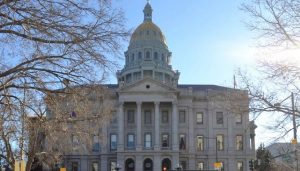
Category Archives: Editorial
The Growing Fight Over Forcing Nonprofits to Disclose Donors
POLITICSNEWS
The Growing Fight Over Forcing Nonprofits to Disclose Donors

Lawmakers and conservatives in states across the country are growingly concerned that the push for donor disclosure will harm privacy rights. (Photo:JGI/Jamie Grill Blend Images/Newscom)
Conservatives in states across the country say that pushes to pass laws requiring nonprofits to report their donors’ private information threaten First Amendment rights.
“I’ve been contacted by dozens of constituents with concerns over their rights to privacy, and possible harassment by organizations or individuals, or even their employers, if their donation histories are made public,” Oklahoma state Rep. Mark Lepak, a Republican, told The Daily Signal in an email.
At least a dozen states have considered such donor disclosure legislation this year, but none has been successful, according to the State Policy Network, a nonprofit organization that supports independent think tanks around the nation.
“Since Jan. 1, 16 states have considered laws that would require causes and groups like The Heritage Foundation to report the names and addresses of their supporters to state government,” Tracie Sharp, president and CEO of the State Policy Network, said in an email to The Daily Signal.
Heritage, a leading conservative think tank, is the parent organization of The Daily Signal, its multimedia news operation.
None of these donor disclosure initiatives has passed so far, Starlee Coleman, senior policy adviser at the State Policy Network, told The Daily Signal in a phone interview.
When a Tax Increase Isn’t a New Tax
When a Tax Increase Isn’t a New Tax
High court rules incidental, minimal tax revenue increase doesn’t violate TABOR

According to the Colorado Supreme Court, legislation that causes an incidental and de minimis increase in tax revenue does not amount to a “new tax” or “tax policy change” under the Taxpayer Bill of Rights, and consequently doesn’t require voter approval.
The decision issued April 23 in TABOR Foundation v. Regional Transportation District settles a 2013 lawsuit against RTD, Scientific and Cultural Facilities District and Colorado Department of Revenue that claimed House Bill 13-1272 violated TABOR because it resulted in a revenue increase without voter consent. The legislature passed the bill to realign sales taxes levied by RTD and SCFD with the state sales tax. Although the districts and state share a taxable base tangible personal property — the taxes levied had diverged over the years due to various differing exemptions.
House Bill 1272 removed exemptions from the districts’ taxes on sales of cigarettes, direct-mail advertising materials, candy, soft drinks, and nonessential food containers. Its passage resulted in a projected tax revenue increase of 0.6 percent for the districts, which amounted to less than 1 percent of SCFD’s budget and one thousandth of RTD’s budget. The TABOR Foundation sued the districts, claiming the removal of exemptions constituted a “new tax” or “tax policy change” because they resulted in the districts taxing things they had not before.
But the Supreme Court disagreed, and upheld the districts’ analysis of House Bill 1272’s purpose to simplify tax collections and ease administrative confusions associated with the exemption divergences. The court concluded the revenue increase was incidental and de minimis, so it did not violate TABOR.
Colorado’s Supreme Court has once again weakened taxpayers’ rights
Join the TABOR offensive!
Join the TABOR offensive!
- April 12, 2018
 The Taxpayer’s Bill of Rights is universally despised, neigh, deplored by every tax-happy progressive around the country. Ever wonder why it’s like sunlight to a vampire to them, and why they’ve weakened it in court-ruling after court-ruling for 25 years? Then please join us on Monday, April 23, in Colorado Springs for our first stop on the TABOR Road Show 2018.
The Taxpayer’s Bill of Rights is universally despised, neigh, deplored by every tax-happy progressive around the country. Ever wonder why it’s like sunlight to a vampire to them, and why they’ve weakened it in court-ruling after court-ruling for 25 years? Then please join us on Monday, April 23, in Colorado Springs for our first stop on the TABOR Road Show 2018.
There’s a growing coalition of national, state, and local TABOR supporters that won’t tolerate any more attacks on or weakening of the greatest gift Colorado voters ever gave themselves or future generations – the Taxpayer’s Bill of Rights and the right to vote on increases in taxes and debt. We are crisscrossing the state to let people know about the TABOR Yes coalition, some two dozen strong and growing, and why Coloradans should fall in love with TABOR again.
For additional information on TABOR and our coalition, visit our Web site TABORYes.com.
Monday, April 23rd
5:30-7 PM
Local Host: SpringsTaxpayers.com
Emcee: Jeff Crank, The Jeff Crank Show
Moderator: Amy Oliver Cooke, Independence Institute
Panelists:
Michael Fields, Americans for Prosperity Foundation
Jon Caldara, Independence Institute
Hadley Heath Manning, Independent Women’s Forum (invited)
Supported by the
TABOR YES COALITION
Americans for Prosperity- Colorado
Americans for Tax Reform
America’s House of Commons
Americhicks
Approval Voting
Arapahoe Tea Party
CATO Institute
Centennial Institute
Center for Freedom Prosperity
Coalition to Reduce Spending
Colorado Issues Coalition
Colorado Log Cabin Republicans
Colorado Union of Taxpayers
Independence Institute
Independent Women’s Forum
Mountain States Legal Foundation
National Asian Indian Republican Association
Reagan Republicans
Republican Liberty Caucus Colorado
SpringsTaxpayers.com
Taxpayers Chamber of Commerce
Taxpayers Protection Alliance
The Hudson Firm
The Steamboat Institute
Wake Up with Randy Corporon (710 KNUS)
Kelsey M. Alexander
Barbara Piper
Dennis Polhill
Geri Zahner
Study: Colorado has sixth lowest tax burden in U.S.
Study: Colorado has sixth lowest tax burden in U.S.

jackanerd | Shutterstock.com
Colorado’s state and local tax burden was the sixth lowest in the U.S. in fiscal 2016, according to a recent report produced Key Policy Data (KPD), a joint venture between Public Choice Analytics and Visigov.
The report relies on an income-based analysis dividing the state’s total tax collections by its private sector personal income. The national average using this methodology was an overall local and state tax burden of 14.3 percent of income; Colorado’s was 11.8.
KPD compared the burden of tax systems across states by measuring tax collections against the size of the economy. It defines this as the “total private sector share of personal income, which is personal income minus government compensation and personal current transfer receipts” such as Social Security, Medicare and Medicaid.
Colorado’s Taxpayer Bill of Rights Should Be a Model for All States
Colorado’s Taxpayer Bill of Rights Should Be a Model for All States

In 1992, the Taxpayer’s Bill of Rights (TABOR) Amendment was adopted by Colorado voters to limit government growth and to put Coloradans in control of tax and debt increases. Under TABOR, the state and local government cannot raise taxes or increase the debt without voter approval.
TABOR is unique to Colorado. Currently, no other state in the union has a Taxpayer’s Bill of Rights.
There are important reasons why TABOR is not only justifiable, but necessary.
- More Democratic – Referendums are a more democratic way to make decisions on government spending. When it comes to raising taxes or increasing the debt, voters, not legislators—who may be beholden to outside interests—should have the final say. After all, taxpayers are ultimately the ones on the hook for tabs run up by the state. Remember the whole “No taxation without representation” thing? This is about the consent of the governed, a principle so important… it sparked the U.S. Revolution.
- Financial Freedom –Under TABOR, lawmakers lack the power to impose higher taxes without consent from the voters. As Grover Norquist, President of Americans for Tax Reform, put it:
Grocery tax is well past its expiration date
Grocery tax is well past its expiration date
There was a time when our town only had two grocery stores and a handful of gas stations.
Before the redevelopment of our downtown core — before the factory outlet — and even before our state recognized the Taxpayer’s Bill of Rights (TABOR), our town services subsisted on the grocery tax. Because we had nothing else.
We paid for our cops, built our roads, and ran a town government through the direct taxation of the milk and bread that was purchased at those two, small grocery stores.
But we aren’t that small town anymore.
With the addition of the Promenade and continued improvement in the economy, we are seeing our town coffers grow to more than $44 million in sales tax revenue in 2017 alone. In 2016, that number was $39 million.
Yet in spite of a healthy and diversified economy here in town, we continue to incorporate the most regressive sales tax imaginable.
Constitutionality of Grand Lake fee questioned by TABOR Committee
Constitutionality of Grand Lake fee questioned by TABOR Committee
February 8, 2018
A furor was stirred up in Grand Lake earlier this year after town officials announced the implementation of a new municipal fee, and now one state advocacy group is calling into question the fee’s legitimacy.
In late January, the Tax Payer’s Bill of Rights Committee, or TABOR, the advocacy arm of the independent TABOR Foundation, issued a letter to Grand Lake’s town government, contesting the legal basis for the recently adopted fee, which imposes an additional $100 charge on each water tap within the community. The charge has been earmarked to pay for law enforcement and emergency dispatch services as well as street lighting.
“New receipts are to be deposited to the general fund and are intended to cover expenses that are traditionally core functions of town governance, namely street lighting and safety,” read the letter from the TABOR Committee. “Although the Colorado Constitution clearly calls for citizens to vote on all new taxes, you are trying to avoid the plain language of the Taxpayer’s Bill of Rights by identifying the new tax as a ‘fee.'” Continue reading
Grover Norquist: Republicans produce nationally, but in Colorado they betray taxpayers locally
by Grover Norquist |

Some Republican state legislators remind us that no one’s life is a complete waste — some simply serve as bad examples. One of those bad examples can be found in Colorado. (AP Photo/P. Solomon Banda)
Congress just proved an amazing thing happens when Republicans remember to govern as Reagan Republicans.
The most substantial tax overhaul since the Reagan years has sparked our economy. Republicans in Congress gathered the courage to face down the pro-tax media, special interests, and the opposition of every single Democrat in Congress to help families keep more of what they earn. Already tax reform has resulted in at least 285 companies announcing wage increases, bonuses, and higher 401(k) matches for 3 million workers. Utility companies are reducing rates in response to the Tax Cuts and Jobs Act. Continue reading


